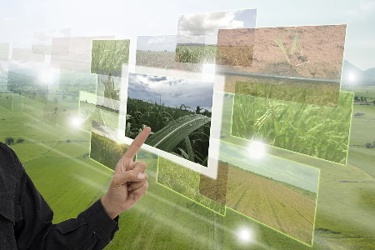Data Integration, Key To The Future Of Smart Irrigation

- The agricultural sector requires profound transformation to meet the challenges posed by water scarcity, rising prices and the need to be more competitive.
- Data integration, which spearheads digital transformation, enables irrigation associations to deploy new technological solutions that harness data to usher in greater sustainability, say Idrica's experts.
Integrated water cycle management encompasses the complex task of managing the systems and processes that supply drinking water to the world’s population and irrigation for farming, among other things. According to the World Bank, irrigated agriculture accounts for 20% of the world’s cultivated land and contributes 40% of total food production worldwide. These figures are expected to increase in the coming decades due to population growth, mass urbanization and climate change, among other factors. Innovative solutions that optimize irrigation infrastructure management and improve water efficiency must therefore be implemented.
Against this background, technological advances in the sector have become one of the most reliable ways forward. Thus, remote sensors, the Internet of Things (IoT), artificial intelligence and data analysis can be instrumental in helping growers to increase crop efficiency and boost sustainability in a crucial sector for global food security. These technologies can also help to stem population decline in rural areas, as pointed out by the Ministry of Agriculture, Fisheries and Food (MITECO).
Along these lines, experts point out that the digital transformation of processes is one of the most promising technological opportunities available to reduce today's water scarcity. Some of the major advantages it brings include operational and management improvements, cost reductions, and increased value. According to the Global Water Intelligence report entitled Accelerating the digital water utility (2019), the ROI from automating operations can be as high as 14%.
Similarly, integrating data into innovative vendor-agnostic technological solutions is the first step towards more proactive, automatic management in a range of areas such as smart irrigation, according to Idrica, an international Spanish water-sector technology company. In the words of Begoña Tarrazona, an Irrigation Specialist at the company, the current challenges "showcase the need to use more cutting-edge technologies that optimize water resource management. It is therefore essential to fit sensors to assets and install robust data transfer equipment that transmits information in real time to technological platforms that can analyze this data, generate reports, store historical records, forecast demand and send alerts when any value is out of range".
Data Management
So, what exactly is the purpose of data management, and what are the benefits of data mining? According to the Idrica specialist, it is essential to understand the benefits before implementing any data-oriented projects.
One of the direct benefits, according to Begoña Tarrazona, is the reduction of operating costs (OPEX). In this regard, the Idrica specialist pointed out that "infrastructure operations are streamlined, irrigation networks become more hydraulically efficient, and water and fertilizer consumption is optimized. In addition, the energy efficiency of pumping systems is enhanced, reducing the carbon footprint". In short, there are three main benefits:
- The service’s operational performance is boosted by harnessing all the information from the monitored assets / infrastructure
- Reduction of NRW (Non-Registered Water)
- Energy consumption optimization
Another benefit of data management is the reduction in the cost of assets (CAPEX). In the opinion of Begoña Tarrazona, real-time control over the assets deployed in the associations "affords early
detection of anomalies in the network, preventing major damage to the irrigation infrastructure and increasing the useful life of the assets."
Finally, the Idrica specialist pointed out the environmental sustainability gains thanks to greater control over consumption and allocated resources, as well as a reduction in the percolation of nitrates into groundwater bodies. In addition, data integration brings irrigation recommendations tailored to each type of crop based on soil moisture and plant vigor indexes obtained from satellite images. The reduction of the carbon footprint, through enhanced energy efficiency, also contributes positively to environmental sustainability.
According to Begoña Tarrazona, digital transformation "will bring profound changes in irrigated agriculture, although the implementation of policies and support programs to promote uptake and training in digital technologies is required." In this sense, a recent survey conducted by ARAG-ASAJA with 200 growers working with irrigated crops showed that, although 87.2% of them were aware that digitalization is something that will become widespread in the medium term, many saw the lack of training and the cost of implementation as stumbling blocks.
In any case, integrating data into the management of irrigated farms is set to play a relevant role in 2024, a year in which governments will continue to invest in digitalizing irrigation with the deployment of recovery and transformation plans. The use of technology platforms based on AI, data integration and machine-learning mechanisms are vital for the future of smart irrigation, bringing better demand forecasting, event detection and, above all, greater farm efficiency aligned with improved sustainability.
About Idrica:
Idrica is a leading international water technology company specializing in digital solutions. Founded by Fomento Urbano de Castellón, S.A. and headquartered in Valencia (Spain), it brings more than a decade of experience in the digitalization of the water sector. Its team of over 200 experts is transforming the management of drinking water, wastewater and irrigation around the world.
Source: Idrica
